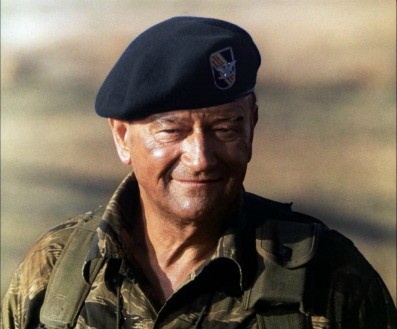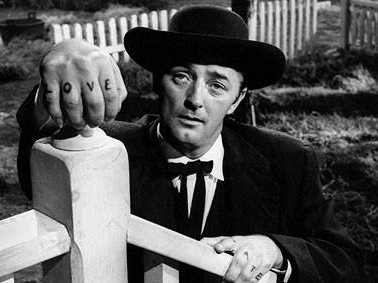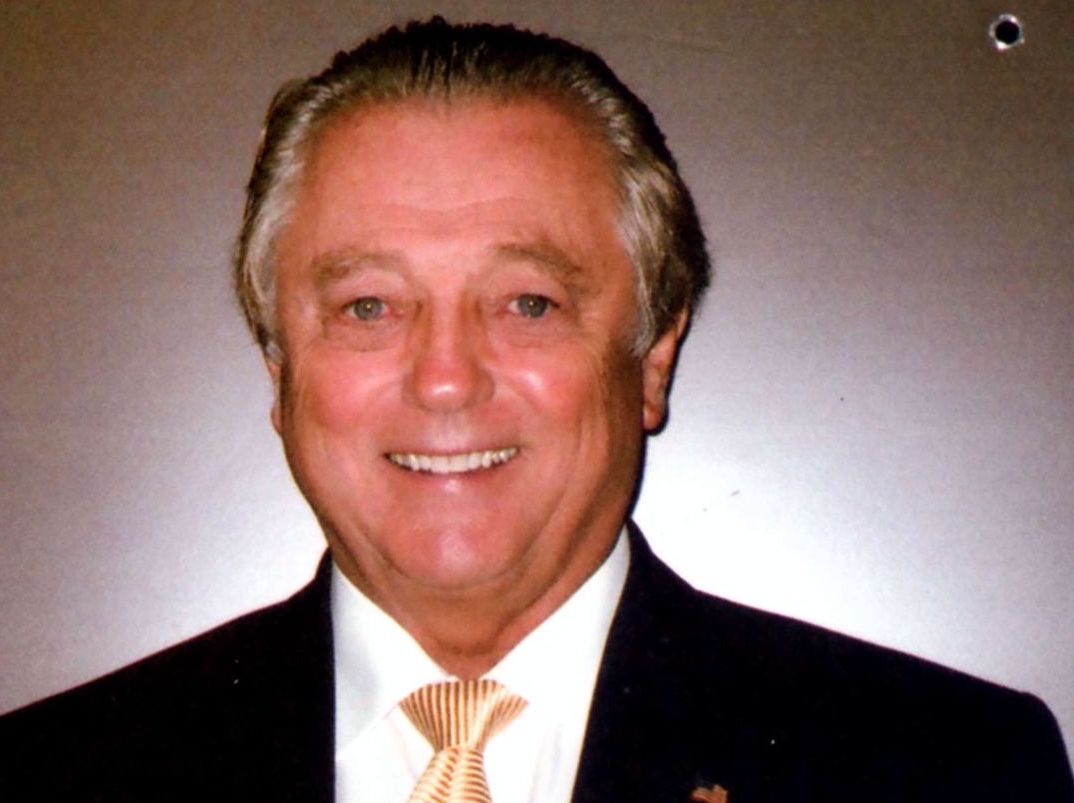“My dad was essentially a philosophical anarchist,” laughs Chris Mitchum about his famous father Robert Mitchum.
“He thought that man was basically good and could govern himself, but he hated authority and didn’t care for heavy handed government. He thought government should just lay out the frame work, then stand back and let the game play itself out,” Mitchum says.
Talking with Mitchum at a Los Angeles watering hole frequented by entertainment industry conservatives seems a lot like what it might have been talking with his legendary father. There’s no pretense or phoniness, just an easy-going strength and straightforward congeniality.
There’s no bitterness in Mitchum’s voice as he takes another sip of his iced tea and relates how just being associated with super star John Wayne suddenly sidelined his rise to fame and fortune.
“I did three pictures with John Wayne – ‘Chisum,’ ‘Rio Lobo’ and ‘Big Jake’ – and TV roles before that. It was Duke who got me a screen test with director Howard Hawks that completely changed my attitude 180 degrees about how to approach acting,” he says.
In 1971 Mitchum won Photoplay‘s Gold Medal Award and was picked by Box Office magazine as one of the top five stars of the future along with Ryan O’Neal. But everything suddenly came to a screeching halt after that major role in Wayne’s “Big Jake.”
“I went 11 months without one interview,” Mitchum recalls–a time when the film industry was buzzing with projects. Finally, the casting director on the comedy “Steelyard Blues” gave him the heads up. “You worked with John Wayne, I can’t even interview you,” he told Mitchum.
Looking back at those times, it all falls into place. The Vietnam War was still a very raw wound and Jane Fonda and Donald Sutherland, two of Hollywood’s biggest, unapologetic far left-wingers, were the film’s stars with Sutherland acting as an executive producer. The far left had finally made their move and were taking over Hollywood with critical box office successes like “Midnight Cowboy” (1969), “Easy Rider”(1969),”M*A*S*H” (1970) and “Klute” (1971).

“Duke was very outspoken about his views on the Vietnam War and how the returning troops had been treated, being spit on and insulted,” he says. “He made so much money for the studios that he couldn’t be affected, but liberal Hollywood never forgave him for making ‘The Green Berets.'”
“Dad and Duke always got along fine. I think the characters played by John Wayne embodied the best of America,” he says. “He always represented someone who stood up for basic American values and what was right, someone who was willing to fight and if necessary die for those beliefs.”
Mitchum speaks fondly of the time he spent with Wayne.
“On ‘Rio Lobo,’ he purposely cheated at chess to see if I’d call him on it. When I finally did he winked at me and said ‘Okay, now lets really play,'” he says.
Mitchum didn’t bemoan the roadblock that left wing Hollywood put in front of him, or go complaining to his father.
“We never really talked about my career. Dad was someone who left his work at the studio. I always admired that,” he says. Instead, Mitchum took a starring role in the Spanish film “Summertime Killers” in 1972, moved to Spain for three years and eventually established himself as a major action star in the European and Far Eastern markets.
In a career that spans more than 30 years, he has done some 60 films including “Tombstone” in 1994, where he shared screen credit with his father, who served as the film’s narrator.
You would think that an actor with such an ingrained bad boy image as Robert Mitchum would have leaned far to the left, but his son dispels any misconceptions.
“Dad did campaign stuff for Barry Goldwater, Ronald Reagan and H. W. Bush. He was all about personal freedom and responsibility,” he says.
Mitchum’s father, number twenty-three on the American Film Institute’s list of greatest male film stars, carved out a place in film history as a laconic tough guy. He could portray complex cowhands, no nonsense private detectives and a broad range of other characters. He was fond of telling overly poky interviewers “Look I have two kinds of acting, one on a horse and one off a horse. That’s it.”

That didn’t belie the complexities the veteran actor could bring to such roles as the mild mannered schoolteacher in “Ryan’s Daughter” (1970), the evil posing preacher in “Night of the Hunter” (1955), the ominous rapist Max Cady in “Cape Fear” (1962), or the hard scrabble Australian family man in “The Sundowners” (1960).
His westerns ranged from the psychological thriller “Blood on the Moon” (1948) to the John Wayne classic “El Dorado” (1966) and the understated realism of “The Wonderful Country” (1959). Modern film critics always associate him with film noir, where his don’t-give-a-damn attitude in films like “The Big Steal” (1949) indelibly stamped an anti-hero image on his roles, but there was so much more to Robert Mitchum as an actor and a man.
“He was a great dad. I didn’t even know he was an actor until Mom brought me to see him in a western when I was four,” his son says. “I looked up at the screen at him with his cowboy hat on and then looked at Mom and went ‘Mom, that’s dad! What’s he doing up there?’ He didn’t play the studio and social games. It was just part of his vagabond nature.”
Never one to shy away from a fight, in 1983 Chris Mitchum heeded a personal request from former six-term Screen Actor’s Guild president Charlton Heston to run for the Guild’s board of directors. The new far left SAG president Ed Asner and his allies were trying to involve the Guild in leftist political controversies like the movement to free cop-killer Mumbai Abu-Jamal and support for communist guerillas in El Salvador. None of which had anything to do with better wages and benefits for working actors. Chris Mitchum served six years on the SAG Board, two years as 1st Vice President. He was also an active member of the conservative Actors Working For an Actor’s Guild opposition that proved a thorn in the side of Asner and his minions.
“Ronald Reagan learned politics as President of the Screen Actor’s Guild and that’s where I learned, too,” he says.
Mitchum’s ingrained dislike of socialist agendas turned him into an inveterate letter-to-the-editor writer in Santa Barbara during the late 1980s.
“People would stop me on the street and say, ‘Good letter’,” he says.
Sacramento noticed, too, and in 1998, Republican Party leader Bill Leonard called to ask Mitchum to run for the State Assembly. He grins as he points out, “If you’re going to mouth off about something – you’d better be ready to back it up.”
Mitchum campaigned hard and set an impressive record of fund raising for a California State Assembly race, narrowly losing in a year that was decidedly pro-Democrat. The deciding factor was a poor turn out by Republican women. Now, he’s going up against liberal Republican and former Lt. Governor Able Maldonado for the party’s nomination to run against Nancy Pelosi ally Lois Capps in the new 24th Congressional District.
It’s a Congressional contest that looks like it’s going to be one of the most watched in the nation. That’s the same Able Maldonado who violated his “No New Taxes” pledge and then voted with State Democrats to pass the massive $41 billion budget deficit gap in 2009 – instead of fighting to cut the budget of real waste and unnecessary spending.
Capps, who has served in Congress for 14 years, is considered vulnerable in the newly redrawn district, and Mitchum’s no nonsense conservative stands and values are already starting to poll strongly with voters.
“Nancy Pelosi and her cronies directly went against the will of the American people to pass the Health Care Bill. She spit on us and she spit on the United States Constitution. This is my chance to stand up and get in the fight for our children and our grand children. We’ve got to wake up America to the fight,” he says. “I think my dad would love me running for office. He loved this country. Dad didn’t go along to get along and neither do I.”
To find out more about Chris Mitchum’s Congressional campaign at: http://chrismitchumforcongress.com/

COMMENTS
Please let us know if you're having issues with commenting.